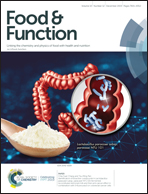Protective effect of Bacillus amyloliquefaciens against Salmonella via polarizing macrophages to M1 phenotype directly and to M2 depended on microbiota
Abstract
Bacillus amyloliquefaciens SC06 (BaSC06), a potential probiotic, plays a positive role in animal growth performance and immune function. The aim of the present study was to investigate the protective effect of BaSC06 against Salmonella infection and its association with macrophage polarization. C57BL/6 mice were fed with or without a BaSC06-containing diet before Salmonella enterica Typhimurium (ST) challenge. Results showed that BaSC06 had a protective effect against ST inoculation and induced both M1 and M2 macrophage polarization in the cecum. An in vitro co-culture model demonstrated that BaSC06 promoted M1 polarization directly, and thus increased the phagocytosis and bactericidal activity against ST. In addition, adoptive transfer of bone marrow-derived macrophages (BMDMs) stimulated by BaSC06 significantly decreased the counts of ST in the spleen. Furthermore, 16S rRNA-based analysis of cecal content showed that BaSC06 significantly increased the proportion of Verrucomicrobia and decreased Bacterodetes. Transplantation of the fecal microbiota from BaSC06-treated animals promoted M2 macrophage polarization in the cecum and significantly relieved inflammation caused by ST. In conclusion, BaSC06 polarized macrophages to the M1 type directly resulting in excellent bactericidal activity. Meanwhile, the microbiota modified by BaSC06 can induce M2 polarization which ameliorates the inflammation caused by ST.



 Please wait while we load your content...
Please wait while we load your content...